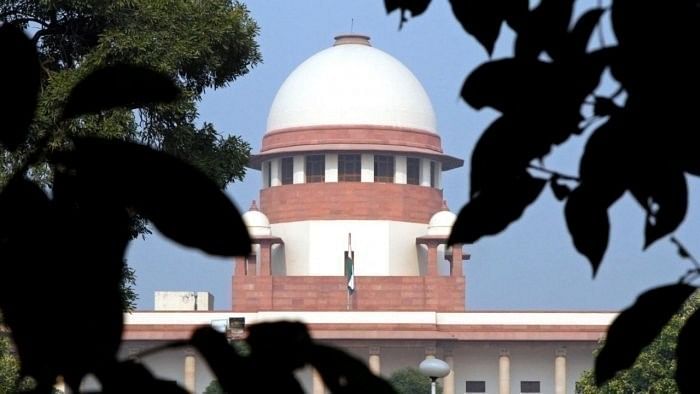
The Supreme Court of India.
Credit: PTI File Photo
New Delhi: The Supreme Court on Tuesday said converting to a religion to derive the benefits of reservation without any actual belief would only defeat the social ethos of the policy of reservation and would amount to "fraud on the Constitution".
A bench of Justices Pankaj Mithal and R Mahadevan dismissed a plea by C Selvarani against the Madras High Court's order of January 24, 2023, seeking a direction to the district authorities to issue her Scheduled Caste community certificate.
"India is a secular country. Every citizen has a right to practice and profess a religion of their choice as guaranteed under Article 25 of the Constitution. One converts to a different religion, when he/she is genuinely inspired by its principles, tenets and spiritual thoughts," the bench said.
"However, if the purpose of conversion is largely to derive the benefits of reservation but not with any actual belief on the other religion, the same cannot be permitted, as the extension of benefits of reservation to people with such ulterior motive will only defeat the social ethos of the policy of reservation," the bench said.
The court said in the instant case, the evidence presented clearly demonstrated that the appellant professes Christianity and actively practiced the faith by attending church regularly.
"Despite the same, she claims to be a Hindu and seeks for Scheduled Caste community certificate for the purpose of employment. Such a dual claim made by her is untenable and she cannot continue to identify herself as a Hindu after baptism. Therefore, the conferment of Scheduled caste communal status to the appellant, who is a Christian by religion, but claims to be still embracing Hinduism only for the purpose of availing reservation in employment, would go against the very object of reservation and would amount to fraud on the Constitution," the bench added.
In the case, the appellant claimed reconversion to Hinduism but it was disputed.
"The conversion had not happened by any ceremony or through Arya Samaj. No public declaration was effected. There is nothing on record to show that she or her family has reconverted to Hinduism and on the contrary, there is a factual finding that the appellant still professes Christianity," the bench said.
In 2015, the appellant applied for the post of Upper Division Clerk and after written examination, she was selected and her name was found at Serial No 48 under Scheduled Caste category.
In the course of certificate verification, though the appellant possessed the required certificates, the respondent authorities insisted her to produce the original latest community, residence and nativity certificates issued by the Tahsildar, within a period of one year from the date of publication of results, which would satisfy the requirement of being a resident in Puducherry.
However, on March 29, 2016, the authorities rejected the appellant’s application on the ground that she does not profess Hinduism, Buddhism and Sikhism and therefore, the community certificate under the SC Order, 1964, could not be issued to her.
The appellant claimed she was born on November 22, 1990 to one Christian S/o Mounien and Santhamarie and her birth was duly registered with Pondicherry Municipality and her parents were permanent residents of Kombakkampet, Pondicherry.
According to the appellant, her father, grandparents and great grandparents professed the Hindu religion and belonged to Valluvan Caste, which is recognised as one of the Scheduled Castes under the SC Order, 1964. Her mother Santhamarie was a Christian by birth and after marriage, she got converted to Hindu religion and started to profess the same.
Thus, according to the appellant, she is a Hindu by religion and belongs to Valluvan Caste; and she successfully completed her school education and graduation by availing concessions under the Hindu Adi Dravida quota.
"Even assuming that the appellant’s mother had converted to Hinduism after marriage, she ought not to have baptized her children in the church and hence, the statement of the appellant is untrustworthy," the bench said.
The court also noted the field verification clearly revealed the registration of the marriage of the parents of the appellant under the Indian Christian Marriage Act, 1872, the baptism of the appellant and her brother and also the fact that they had been regularly attending the church.
The court held any interference with such findings of fact is unwarranted unless the findings are perverse so as to shock the conscience of the court.
"Therefore, we are of the opinion that the respondent authorities, after a thorough enquiry and having analysed the documentary evidence, reached the right conclusion that the appellant was not entitled to the Scheduled Caste Community Certificate," the bench said.
